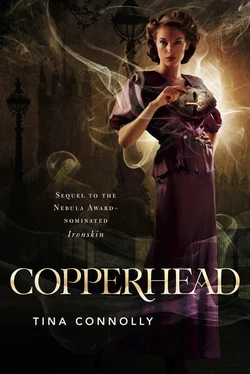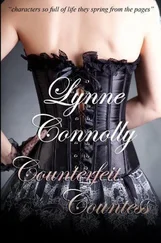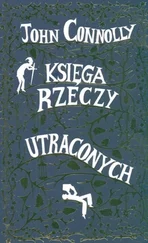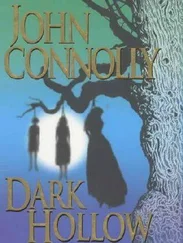“The Fey King,” he breathed. Helen turned big eyes on him. “Trumped-up, self-proclaimed, of course. Ordinary fey are indolent and leaderless. But every so often, one comes along with the willpower to bring them all to heel. That one is here in the city now.”
Helen swallowed. “How do you know?”
“Been studying how to capture the blue demons,” he said calmly. “But then you’ve seen that, you said. Since I turned one of the machines over to our leader for further use and investigation.”
“To … to Mr. Grimsby?” She could hardly hear him say “ our leader” without shuddering.
“He’s continuing to make improvements to best capture and destroy the blue demons. For my part, I have found interrogation with cold iron to be useful.”
Helen’s eyes traveled to the iron building by his forge. Her heart thumped in her chest. How could Jane have such a fondness for this man? He chilled her marrow. “So I have to find Jane,” she said faintly, “before it’s too late.”
There was more silence, which she barely stopped herself from filling with a variety of pleas.
At last he spoke. “Three blocks north, two blocks east. Over the pawnshop there.”
“Thank you,” said Helen. “Thank—”
“There’s something broken in this city,” he said. “Blue scum all over it. Something’s broken and it started with Jane and that havlen woman and whatever happened six months ago. Jane told me she’d received a nasty letter this summer. A death threat.”
Havlen was a derogatory dwarvven term for mixed-race human and dwarvven —Helen vaguely knew the woman Niklas referred to, someone who worked for Edward Rochart. But a death threat? “Oh no,” said Helen.
He steamrollered through her worry. “Jane didn’t say more. And she shouldn’t be mixing herself up with these facelifts—she was getting herself in over her head, I told her. Messing with power she couldn’t control. They should all just be shot, the lot of them. That would take care of that nonsense. We fought.” He exhaled. “Well. I guess I was right. Don’t take any pride in that.” Suddenly a hand was squeezing her shoulder—he had pushed it through a gap in the gate, and was standing right there, huge and frightening. “You find her,” he said. “You find her and make her stop.”
* * *
Helen hurried down the route Niklas had instructed. The night air was bitter on her bare face. She felt around in the carpetbag, pulled out the ironcloth, pressed it to her skin. Perhaps it made her feel safer, but it made it impossible to see in the black night. There weren’t as many gaslights down here, but there were orange-yellow rectangles where taverns let out patrons, spilling into the cold night. And bits of blue. She put the ironcloth away and hurried faster.
Niklas’s words rang through her head. “They should all just be shot, the lot of them.” The Hundred, he meant. And yet Niklas himself was ironskin, cursed just as Jane had been with fey that scarred his skin and emitted a slow stream of poisonous emotion. Helen felt nothing but compassion for The Hundred, the women who had only wanted to be prettier. But perhaps she was alone in that.
Helen had to circle the block before she found the grungy brick building with the three iron balls denoting pawnshop. There was an iron staircase on the outside. Yes, this was the sort of nasty place Jane would run to, something surrounded by iron. Wearily Helen climbed the stairs—and found a locked and no doubt iron-chained door. She banged on it, calling “Jane, Jane.” But no one came.
Helen jiggled the door handle helplessly, thinking of the long, hopeless walk home. She did not realize how thoroughly she had longed to find Jane here until she wasn’t. The frigid iron of the staircase seeped up through the soles of her shoes to her already numb toes; her fingers were curled stiff against the cold.
And then the door was opened from the inside.
Helen looked up, startled, at a figure wearing an iron mask. A lump of disappointment formed in her belly. This person was too tall.
“Oh, hurry in out of that nasty cold stuff,” the person said, quite heedless of the safety protocol that dictated one should spout clever greetings to make sure the fey were not invited over the threshold, lines ranging from the formal “An’ ye be human, enter,” to the cheeky lower-class admonition: “Stay out.” Helen realized after she spoke that it was a woman, despite the fact that she was wearing slacks. Her heavy, dark brown hair was cut in an asymmetric bob that fell across one of the mask’s eyeholes, and the thick scent of jasmine perfume lingered around her. “You must be looking for Jane,” the woman said as Helen entered, stripping off her lilac gloves and blowing on her hands.
“Yes,” said Helen. “I’m her sister. But—”
“Helen!” she said. “How delightful. And so fashionably brave, too.” Her finger inscribed a circle around her own mask, indicating Helen’s lack of one. “I think someone beat us here. Do you know if Jane’s safe?”
“I don’t know where she is,” said Helen, swallowing the crushing disaster down, willing herself to find hope. “But she probably wasn’t here when this happened. I hope.” Her sister was tidy; Helen could not imagine the room being the way it was on Jane’s account. It was unheated and tiny; cot and table and woodstove all in one room, with a single door leading to what she supposed might be the rest of the house, possibly a shared bath. The woman had turned on an oil lamp, and it cast an orange glow around the wreckage of the room.
The room had been ransacked.
“Perhaps she’s out being brave and bold and doing good works,” said the woman.
“Maybe,” temporized Helen. She could not think. If Jane had not gone here, then where would she have gone? Helen and Alistair’s home? It seemed unlikely. What had she said? I have my own plans.…
Helen sent tentative feelers out, wondering what the woman’s purpose was—and if anything could be deduced from her about Jane’s whereabouts. “I suppose you were here to see Jane? She’s trying to explain to you her— our noble goals? Talk you into letting her … you know. Work on your face?” she said. It was as tactful as she could manage around the frostbitten fingers and the tangled knots of worry.
“You’ve got it all wrong,” the woman said. “I’m dying to have my old face back. Let’s rip it off.”
“Really?” said Helen. “Most women have been very resistant. So far only—,” but she thought belatedly that perhaps she shouldn’t mention poor Mrs. Grimsby.
“Well, I don’t care what anyone else thinks,” the woman said decidedly. “I wouldn’t have done it except it seemed good for my career. But then the visions!”
“Did you have nightmares, too?” said Helen.
“Oh, my goodness. Did you have dreams where a bunch of beautifully creepy men and women stood around you in a circle and then it turned out they were all wearing your face?”
“Um. No,” said Helen.
The woman paced around the overturned chairs, setting them up straight for something to do. Her face went in and out of the shadows flung by the oil lamp. “I’m an actor, you see. But I always got the odd roles. The wacky maiden aunt. The cryptic fortune-teller. And then I heard about this man who would make you beautiful, and I thought, wouldn’t it be nice to be the ingénue for once?” Her brusque voice momentarily went wistful. “You see what I mean, don’t you?” She pulled off her iron mask to reveal an exquisitely strong, purposeful face. Striking and glamorous with the fey, and yet Helen could imagine the face as it must have been before—the sort of woman you might call handsome if you wanted a way to describe how her face made you feel—a woman with purpose and character in spades, but not a beauty.
Читать дальше












